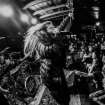Subverting religion. Donning ghostly face paint and all-black attire. Shredding. Certain theatrical elements will forever remain metal as hell — and have captivated generations of fans and catapulted artists from Alice Cooper to King Diamond to Ghost to worldwide success.
The cryptic new four-piece band Dogma checks all these boxes. But this group — which performs in low-cut nuns' habits and bills itself as "a cult, a sect, a secret society" — has done something no other band in their tradition dared: They wrote a song about using a corncob as a gateway to sexual liberation.
The tune in question, "My First Peak," sounds a little like a glam-metal Lady Gaga fronting Ozzy's No More Tears-era band, which means it's powerful. Lyrics about raw corn as a pleasure-giver are, well, raw — but they speak to the larger message behind Dogma's entire operation.
"We stand against the repression of self, including sexuality," the group's statement of purpose reads. "If you want something, go for it."
Not surprisingly, their seductive, catchy mix of NWOBHM-influenced occult rock is grabbing people's attention, including MNRK Heavy (home of High on Fire, the Callous Daoboys and others), who are releasing their self-titled full-length debut.
Throughout the new record, Dogma — who are identified only by their pseudonyms: Lilith (vocals), Lamia (guitars), Nixe (bass) and Abrahel (drums) — lay out their potent anti-repression "gospel." "
Forbidden Zone" catalogs horny visions of Saint Michael slaying Satan. The video for "Carnal Liberation," which cannily plays around with a church organ, reaches its climax with a full-on orgy soundtracked by a histrionic guitar solo and pounding drums.
Dogma, as a project, are upfront about their aims, which are built around 13 motivational principles (beginning with "be a person of integrity") that push a strong individualist, anti-religious platform. The players themselves are far more guarded about their own biographical details.
"We try to avoid everything that is related to a country or a physical place or our identities," Lilith tells Revolver. "Because we don't want to focus on that. We want to spread our message."
The band's chosen vessels for said message are profane nuns making heavy music that feels beamed directly from 1985: fist-pumping riffs, big choruses and a playful touch of melodrama (behold the Eurovision-ready synth in "Forbidden Zone").
As Lilith explains, the decade represents their shared musical heritage: "We all have different backgrounds. We can range from Miles Davis to King Diamond to Aretha Franklin to Iron Maiden. If we put together what we all have in common, musically speaking, we all have a deep reverence for the music of the Eighties."
Dogma's songs are presented as chapters in an unfolding saga of self-reclamation — women bristling against the rigors of institutional oppression and finding ultimate freedom. The most paramount, of course, is sexual. It's theater, but like any production, the subtext is crucial for decoding the true meaning.
In Dogma's case, the target of their ire isn't just organized religion — it's also the current global climate of polarization, and censorship, as it plays out across our feeds online.
"There's certain things you cannot mention on social media — everything related to being politically correct," Lilith says. "You cannot say certain words. You cannot express your opinion on certain things. It seems like having an opinion is wrong, and that's actually messed up."
"Religion is fading, finally, but now the fanaticism is going to politics," she continues. "If you're from a certain party or you think a certain way, then you are a morally correct person. That's completely insane. How can you be more moral than others just because you follow a certain party? That's ridiculous. That's why we say that the only god that exists is actually yourself."
But lest the Dogma takeaway be viewed as carpe diem, the singer is unequivocal: "It's not like, 'Live your life, you're gonna die soon.' It's not about that."
What it is about, Lilith says, is "finding your own path." For Dogma, this sometimes means railing against the uphill battle that bands face to gain traction in the age of endless internet distractions, including, she says, platforms like OnlyFans.
"Very successful bands [have] less followers than a random girl just because she has big boobs, or a guy that is very muscular."
Lilith quickly recognizes what that might sound like coming from a group of sexy metal nuns, and clarifies: "We're not against OnlyFans!"
Still, the singer does equate our modern image-obsessed society to a rotten apple — but it's not one that she's ready to toss out quite yet. Instead, Dogma plan to stick around, get messy and keep churning out their alluring brand of blasphemous headbangers.
"[Music] is the tool that we have for this, you know? You have to be inside of the apple in order to explore."












